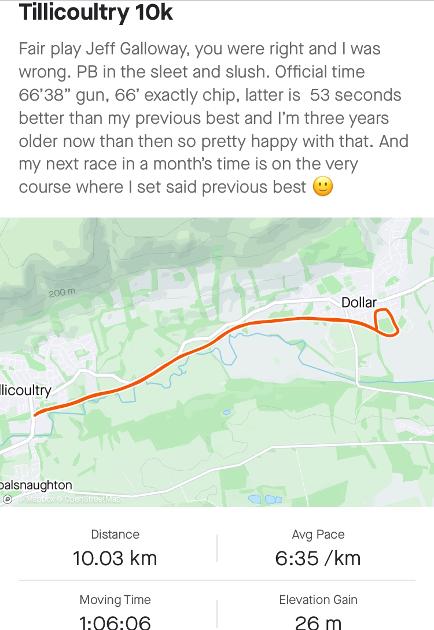Last month I ran my first official half marathon at Falkirk. I decided to jeff it as a family illness and subsequent bereavement had eaten into training time. The downslope on my Strava fitness graph was scary!
It was my first attempt at the half marathon distance since lockdown. I did 5 minutes run / 2 minutes walk and got round in 2:42:00. No previous race times to compare but set against my pre-lockdown runs on Strava it was a PR by 8 minutes. Nothing remarkable though as all those previous attempts were jeffing as well. What was remarkable was how well I felt afterwards- not only was the run very comfortable till the last mile or two, but I recovered well enough to run another race, albeit a 5k, two days later.
Then - after three and a bit years of mostly successful experimenting with jeffing - I decided to read Jeff Galloway’s book 😂 For the most part it confirmed what I’d read on here and what I’d learned myself by trial and error. But a couple of things were new to me. One of these was his insistence that the walk breaks need only be 30 seconds. I’d been doing 3 min / 2 min or 5 min / 2 min and felt I needed at least 90 seconds to recover properly.
Nevertheless I thought I’d give it a try. I did 80 sec / 40 sec on a ten mile training run. Training remember, not a race, not pushing it. Looked at my watch and saw I was running faster than my parkrun PB pace but only for 80 seconds at a time so it felt easy. Ended up with my third best 10 miles and third best 10k on Strava. Might be something in this.
So Tillicoultry 10k yesterday and I thought OK, this is just a stepping stone race, my proper target is the Paris Half so good time to experiment. Let’s try the 90/30 the book recommends for my particular pace.
Race day - heavy sleet throughout and slush on the ground. Pipe dreams of a PB fly out of the window as caution is the watchword. That’s OK though, can still try the 90/30 experiment.
Start off with a 5min jog, look at watch and pace is slowish but that’s because I’m being careful on slippy ground. After 5 mins press the magic button on my watch to switch to 90/30. Pace for the first 90sec interval is a good bit faster than for the initial 5 mins. The field is less crowded and I’m getting used to the ground conditions. Too slippy to sprint but I wouldn’t sprint this distance anyway.
The watch’s finish time predictor keeps changing its mind - that will happen when you keep switching from running to walking - but my average pace is close to PB. And sure enough I cross the line in 66 mins flat. PB by 53 seconds. Interestingly I haven’t broken 33 minutes for a parkrun all year!
Jeff was right, I was wrong. I actually could have gone faster I think but conditions required care. Garmin is screaming at me that I overdid it but I’m confident I didn’t: I think the weather messed with the HRM. But that previous PB was all run, when I was three years younger and my parkruns were 2 mins faster, and it took me a couple of days to recover. To beat it by jeffing and feel absolutely fine today is amazing.
And that brings me to the other new insight from the book, that I hadn’t worked out for myself though with hindsight I should have. The runner’s high. That amazing feeling at the end of a hard race. The thing that makes people say ‘never again’ as they cross the line yet sign up for another one on the bus home.
Jeff Galloway explains that the endorphins that cause that rush of happiness are actually being produced all through the race but are used to combat the discomfort of running hard for a long time. By running in short bursts you can experience the runners high ALL THE WAY ROUND. Based on my last two races I think that’s probably an exaggeration but there’s something to it all the same. I really enjoyed the Falkirk Half, I wasn’t struggling at all until my legs got tired around 19k and even then my heart and breathing were very comfortable. At Tilli, when you’re running in freezing sleet with wet feet on slippy ground, ‘high’ is probably not the word you’re looking for. But I didn’t find it difficult and didn’t hate it the way other runners seem to have. I was cold and wet but that’s all: the actual running was easy, yet I smashed a three year old PB.
I’m now wondering if it’s realistic to aim for 2h30 in Paris. Previously I’d avoid a half if it had a three hour cutoff. Game changer for me.
